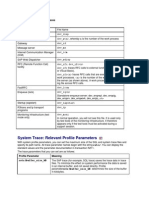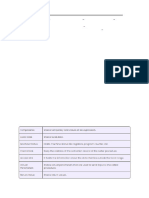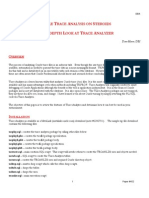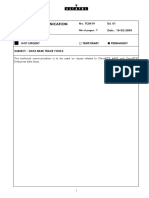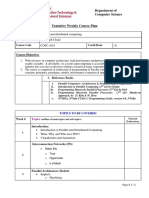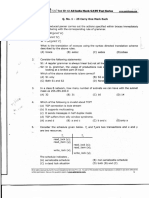Oracle Solaris 11 Administrator'S Cheat Sheet For Dtrace
Oracle Solaris 11 Administrator'S Cheat Sheet For Dtrace
Uploaded by
debugerCopyright:
Available Formats
Oracle Solaris 11 Administrator'S Cheat Sheet For Dtrace
Oracle Solaris 11 Administrator'S Cheat Sheet For Dtrace
Uploaded by
debugerOriginal Title
Copyright
Available Formats
Share this document
Did you find this document useful?
Is this content inappropriate?
Copyright:
Available Formats
Oracle Solaris 11 Administrator'S Cheat Sheet For Dtrace
Oracle Solaris 11 Administrator'S Cheat Sheet For Dtrace
Uploaded by
debugerCopyright:
Available Formats
Oracle Solaris 11 Administrator's Cheat Sheet for DTrace
Oracle Solaris 11 Cheat Sheet
DTrace
What is DTrace?
DTrace Command Components
Oracle Solaris DTrace is a comprehensive, advanced tracing tool for troubleshooting
systematic problems in real time. Administrators, integrators and developers can use
DTrace to dynamically and safely observe live production systems for performance issues,
including both applications and the operating system itself. DTrace allows you to explore
your system to understand how it works, track down problems across many layers of
software, and locate the cause of any aberrant behavior. Whether its at a high level global
overview like memory consumption or CPU time, to much finer grained information like what
specific function calls are being made, DTrace gives the operational insights that have long
been missing in the data center.
A typical DTrace command has several components:
Understanding DTrace providers and probes
Oracle Solaris 11 is littered with many different points of instrumentation places of interest
to which you can bind actions so you can understand what is going on in your system at any
point in time. These probes, or programmatical sensors, are at the heart of DTrace and as
they fire, data can be gathered and reported back to the user. DTrace probes are delivered
through a series of kernel modules called providers.
Common DTrace Providers
dtrace
syscall
fbt
profile
proc
pid
io
sdt/usdt
sched
lockstat
Description
Start, end and error probes
Entry and return probes for all system calls
Entry and return probes for all kernel calls
Timer driven probes
Process creation and lifecycle probes
Entry and return probes for all user-level
processes
Probes for all I/O related events
Developer defined probes at arbitrary
locations/names within source code for kernel
and user-level processes
Probes for scheduling related events
Probes for locking behavior within the operating
system
A 4-tuple identifier provider:module:function:name, where module is a kernel
module or application library, and function and name are the routines that are to be
instrumented. If any of these are left black, it is equivalent to a wildcard match. For
example, to fire all entry routines in the syscall provider we would use the
following:
syscall:::entry
A predicate, or relational expression, that determines whether any action should be
taken. For example, to check whether the process name matches bash we would use
the following:
/execname == bash/
An action for what should happen if the probe fires and the predicate is satisfied. For
example, we may create an array and count the number of times a function call has
been made we would use the following:
{ @array[probefunc] = count(); }
D Scripting Language
As DTrace command line examples become more complex, it may be necessary to construct
them using the D scripting language an awk like script that can be run using the dtrace s
command. D scripts can consist of multiple clauses that usually specify one or more probe
descriptions, and their associate predicates and actions.
#!/usr/sbin/dtrace s
probe-description
/predicate/
{
action;
}
Did you know?
You can find out more information about the Oracle Solaris DTrace, including product
documentation, how to guides, and other resources on Oracle Technology Network:
http://www.oracle.com/technetwork/server-storage/solaris11/technologies/dtrace-1930301.html
Oracle Solaris 11 Administrator's Cheat Sheet for DTrace
DTrace Aggregations, Actions and Subroutines
DTrace Variables and Associative Arrays
DTrace specifies both scalar variables and associative arrays.
Variable scope can be global, thread local or clause local. Thread local variables allow
separate storage for each threads copy of that variable and can be expressed using the
following:
self->varname = 123;
Clause local variables are only active for the duration of the clause lifecycle and can be
expressed using the following:
this->varname = 123;
Associative arrays are used to represent collections of data elements that can be retrieved
by specifying a name called a key and are expressed in the following form:
name[key] = expression;
Common Built-in Variables
args[]
psinfo_t *curpsinfo
string execname
pid_t pid
string probefunc
string probemod
string probename
string probeprov
uint64_t timestamp
unint64_t vtimestamp
Description
The typed arguments to the current probe
accessed as args[0], args[1], but the type
corresponds to probe in question
The process state of the process associated with the
current thread, as described by proc(4)
The name that was passed to exec(2) to execute the
current process
The process ID of the current process
The function name portion of the current probes
description
The module name portion of the current probes
description
The name portion of the current probes description
The provider name portion of the current probes
description
The current value of a nanosecond timestamp
counter
The current value of a nanosecond timestamp
counter that is virtualized to the amount of time that
the current thread has been running on CPU, minus
time spent in predicates and actions
DTrace provides several built-in aggregating functions to aggregate data rather than rely
on individual data points. Aggregations can be expressed using the following:
@name[key] = aggfunc (args);
Common Aggregation
Functions
count
sum
avg
min
max
lquantize
quantize
clear
trunc
Description
Number of times that the count function is called
The total value of the specified expressions
The average of the specified expressions
The smallest value among the specified expressions
The largest value among the specified expressions
A linear frequency distribution of values of the specified
expression, sized by a specific range
A power-of-two frequency distribution of values of the
specified expression.
Clear values in an aggregation
Truncate aggregation data to certain values
Actions enable DTrace to interact with the system outside whether to record data or
perform destructive behavior (with required security privileges). Subroutines are used to
affect internal state such as string manipulation
Common Actions and
Subroutines
trace
printf
printa
stack
ustack
stop
copyinstr
strjoin
strlen
Description
Outputs the result of an expression to the buffer
Outputs the arguments to the buffer with a specified
format
Outputs the aggregation arguments to the buffer with a
specified format
Outputs kernel stack to the buffer
Outputs the user-level stack to the buffer
Stops the process that fired the probe (destructive)
Copies string from address referenced by pointer to the
buffer
Concatenates two strings
Returns length of a string
Oracle Solaris 11 Administrator's Cheat Sheet for DTrace
Useful DTrace One Liners
Trace the creation of new processes and output their arguments:
# dtrace -n 'proc:::exec-success { trace(curpsinfo->pr_psargs); }'
Trace files opened/created by process name:
# dtrace -n 'syscall::openat*:entry { printf("%s %s",execname,copyinstr(arg1)); }'
Trace the number of system calls made by process name:
# dtrace -n 'syscall:::entry { @num[execname] = count(); }'
Trace the process name every time a system call is made:
# dtrace n syscall:::entry { trace(execname); }
Trace the number of system calls made for each system call:
# dtrace -n 'syscall:::entry { @num[probefunc] = count(); }'
Trace the number of system calls made by process id:
# dtrace -n 'syscall:::entry { @num[pid,execname] = count(); }'
Trace lock times by process name:
# dtrace -n 'lockstat:::adaptive-block { @time[execname] = sum(arg1); }'
Trace file I/O by process name (measured in blocks):
# dtrace -n 'io:::start { printf("%d %s %d",pid,execname,args[0]->b_bcount); }'
Trace the writes in bytes by process name:
# dtrace -n 'sysinfo:::writech { @bytes[execname] = sum(arg0); }'
The DTrace Toolkit
The DTrace Toolkit includes a number of pre-written scripts for common system tasks and has been included in Oracle
Solaris 11 by default. These can be found in /usr/dtrace/DTT and cover a variety of areas including file and disk I/O,
memory, CPU, and network.
Oracle Solaris 11 Administrator's Cheat Sheet for DTrace
Contact Us
For more information about Oracle Solaris 11, visit oracle.com/solaris or call +1.800.ORACLE1 to speak to an Oracle representative. Last updated: April 11, 2013.
Copyright 2013, Oracle and/or its affiliates. All rights reserved.
This document is provided for information purposes only and the contents hereof are subject to change without notice. This document is not warranted to be error-free, nor subject to any other warranties or conditions, whether expressed orally or implied in law, including
implied warranties and conditions of merchantability or fitness for a particular purpose. We specifically disclaim any liability with respect to this document and no contractual obligations are formed either directly or indirectly by this document. This document may not be
reproduced or transmitted in any form or by any means, electronic or mechanical, for any purpose, without our prior written permission.
Oracle and Java are registered trademarks of Oracle and/or its affiliates. Other names may be trademarks of their respective owners.
All SPARC trademarks are used under license and are trademarks or registered trademarks of SPARC International, Inc. UNIX is a registered trademark licensed through X/Open Company, Ltd. 0410
You might also like
- Hardening Oracle Linux ServerDocument4 pagesHardening Oracle Linux ServerTran HieuNo ratings yet
- Full Final Lab Mannual Cyber PDFDocument105 pagesFull Final Lab Mannual Cyber PDFMadhavi DaveNo ratings yet
- Department of Information Technology Faculty of Engineering and TechnologyDocument40 pagesDepartment of Information Technology Faculty of Engineering and TechnologyHarry CNo ratings yet
- Manual Downgrade Panasonic - Win 7Document28 pagesManual Downgrade Panasonic - Win 7erwin100% (1)
- SaaS Marketing Automation Playbook TeaserDocument19 pagesSaaS Marketing Automation Playbook TeaserValery FenskeNo ratings yet
- TSN410 Manual: 1. Key FeaturesDocument1 pageTSN410 Manual: 1. Key FeaturesJulio César Vilca VergarayNo ratings yet
- 2020 2021 l41 DtraceDocument6 pages2020 2021 l41 Dtracez8538350No ratings yet
- Troubleshooting Java Programs With Dtrace: Arieh Markel Sun MicrosystemsDocument50 pagesTroubleshooting Java Programs With Dtrace: Arieh Markel Sun MicrosystemsgabjonesNo ratings yet
- Dynamic Tracing For Exploitation and Fuzzing FinalDocument31 pagesDynamic Tracing For Exploitation and Fuzzing FinalXdaliteNo ratings yet
- Snort Diagrams For Developers: Andrés Felipe Arboleda Charles Edward BedónDocument22 pagesSnort Diagrams For Developers: Andrés Felipe Arboleda Charles Edward BedónVũ TuấnNo ratings yet
- File Names For Developer TracesDocument4 pagesFile Names For Developer TracesAnant SinghNo ratings yet
- CSL 332Document103 pagesCSL 332DjNo ratings yet
- Linux 56 AssignmentDocument32 pagesLinux 56 Assignmentr_k_sNo ratings yet
- Linprivesc - PuckieStyleDocument26 pagesLinprivesc - PuckieStylepeterndindi41No ratings yet
- TR-4158-0413 Operational Best Practice Naming ConventionDocument10 pagesTR-4158-0413 Operational Best Practice Naming Conventionnarit_kNo ratings yet
- Trace PLDocument39 pagesTrace PLnagarajuvcc123No ratings yet
- S3D User ManualDocument27 pagesS3D User ManualPierre OlivierNo ratings yet
- 51 Solaris Dev Day DTrace060522Document126 pages51 Solaris Dev Day DTrace060522gabjonesNo ratings yet
- Compiler Design_Unit-4Document42 pagesCompiler Design_Unit-4tr.anuvarshiniNo ratings yet
- A Kernel Trace Device For Plan9Document29 pagesA Kernel Trace Device For Plan9matematikralj_2No ratings yet
- Network Lab ManualDocument12 pagesNetwork Lab Manualcoverdrive48No ratings yet
- RecordDocument187 pagesRecordNazna Nachu100% (1)
- DBMS ProfilerDocument3 pagesDBMS ProfilerRam KumarNo ratings yet
- Unit 3Document16 pagesUnit 3Nikhilsai NandanavanamNo ratings yet
- Analyzing Oracle TraceDocument13 pagesAnalyzing Oracle TraceChen XuNo ratings yet
- Ayuda API Win32Document26 pagesAyuda API Win32CualQuieraNo ratings yet
- OS - IAT3 Two Marks QB PDFDocument4 pagesOS - IAT3 Two Marks QB PDF21ITA10 KANNATHALNo ratings yet
- Using Dtrace To Demystify Watchpoints in The Sun Studio DBX DebuggerDocument8 pagesUsing Dtrace To Demystify Watchpoints in The Sun Studio DBX DebuggerBangari NaiduNo ratings yet
- Develop A Rexx Utility (Line Command) That Checks The Presence of The Datasets in The Logon Procedure.Document10 pagesDevelop A Rexx Utility (Line Command) That Checks The Presence of The Datasets in The Logon Procedure.Shreyansh SinhaNo ratings yet
- CS2257Document43 pagesCS2257ramauma100% (1)
- Chapter-3 Run Time Memory ManagementDocument8 pagesChapter-3 Run Time Memory Managementhrp.bizconnectNo ratings yet
- Stored Procedures - IDocument6 pagesStored Procedures - INitin PatelNo ratings yet
- Brock Frank CTO DB ConsultDocument32 pagesBrock Frank CTO DB ConsultdbanothingNo ratings yet
- Oracle Cluster Ready Services 11g - Tips and CommentsDocument41 pagesOracle Cluster Ready Services 11g - Tips and CommentsDin4everNo ratings yet
- Programming Foundation Part1 RecDocument13 pagesProgramming Foundation Part1 Recakshaya.2207005No ratings yet
- Documentation Trace FtraceDocument30 pagesDocumentation Trace FtraceTaisBNo ratings yet
- Chapter 4Document20 pagesChapter 4duyhuy362003No ratings yet
- Oracle GoldenGate NotesDocument9 pagesOracle GoldenGate NotesabishekvsNo ratings yet
- Generating SQL Trace FilesDocument24 pagesGenerating SQL Trace FilesramaniqbalNo ratings yet
- TuningDocument5 pagesTuningSraVanKuMarThadakamallaNo ratings yet
- 1 UNIX System CallsDocument12 pages1 UNIX System CallsHemanshu SharmaNo ratings yet
- Unit 1 Notes of Advance Operating SystemDocument18 pagesUnit 1 Notes of Advance Operating SystemKILLSHOT SKJ100% (1)
- Subject: Cyber Security Lab Manual: Marwadi Education Foundation Group of InstituteDocument106 pagesSubject: Cyber Security Lab Manual: Marwadi Education Foundation Group of InstitutePriyanka DoshiNo ratings yet
- Aos Lab ReportDocument38 pagesAos Lab ReportinnovatorinnovatorNo ratings yet
- (Redhat) Linux Important StuffDocument14 pages(Redhat) Linux Important StuffJagmohan JagguNo ratings yet
- 18CSC302J CN Lab ManualDocument69 pages18CSC302J CN Lab ManualKhushNo ratings yet
- Admind 3Document104 pagesAdmind 3VaderqkNo ratings yet
- A1563225069 - 21914 - 21 - 2020 - Unit 3 INT243Document54 pagesA1563225069 - 21914 - 21 - 2020 - Unit 3 INT243Suresh KumarNo ratings yet
- Tc0419 Data Base Trace ToolsDocument8 pagesTc0419 Data Base Trace ToolsHumberto Ochoa MendezNo ratings yet
- Open Cover DocumentationDocument12 pagesOpen Cover DocumentationKiran BhondweNo ratings yet
- Vue QuicksheetDocument2 pagesVue QuicksheetSunil LingalaNo ratings yet
- Child Processes Exits or A Signal Is Received. For Our Purpose, We Shall Ignore SignalsDocument5 pagesChild Processes Exits or A Signal Is Received. For Our Purpose, We Shall Ignore Signalsshivani porwalNo ratings yet
- Short Answers: Explain About File Handling Utilities?Document10 pagesShort Answers: Explain About File Handling Utilities?rohanNo ratings yet
- Forensic Investigation Extract Volatile Data Manually 1698022671Document26 pagesForensic Investigation Extract Volatile Data Manually 1698022671zedzepNo ratings yet
- Tracing Bind Variables and Waits 20000507Document5 pagesTracing Bind Variables and Waits 20000507José Laurindo ChiappaNo ratings yet
- Red Hat Certified System Administrator Study GuideDocument15 pagesRed Hat Certified System Administrator Study GuideJason SmithNo ratings yet
- 15IT313J-LabManual (Network Protocols and Programming)Document41 pages15IT313J-LabManual (Network Protocols and Programming)Reo SeikoNo ratings yet
- CS350 Operating Systems Winter 2006 Assignment One 1 RequirementsDocument3 pagesCS350 Operating Systems Winter 2006 Assignment One 1 RequirementsKiet NguyenNo ratings yet
- How To Become Unseen On Windows NTDocument20 pagesHow To Become Unseen On Windows NTMiloš LjumovićNo ratings yet
- Backtrack 5 Complete TutorialDocument10 pagesBacktrack 5 Complete TutorialAdrian StokesNo ratings yet
- Python Advanced Programming: The Guide to Learn Python Programming. Reference with Exercises and Samples About Dynamical Programming, Multithreading, Multiprocessing, Debugging, Testing and MoreFrom EverandPython Advanced Programming: The Guide to Learn Python Programming. Reference with Exercises and Samples About Dynamical Programming, Multithreading, Multiprocessing, Debugging, Testing and MoreNo ratings yet
- TensorFlow 2.x in the Colaboratory Cloud: An Introduction to Deep Learning on Google’s Cloud ServiceFrom EverandTensorFlow 2.x in the Colaboratory Cloud: An Introduction to Deep Learning on Google’s Cloud ServiceNo ratings yet
- Procedure Risk and OpportunitiesDocument5 pagesProcedure Risk and Opportunitiesamyn_s100% (5)
- SAP Solution Manager 7.1 Work Centers:: Strategy and OverviewDocument0 pagesSAP Solution Manager 7.1 Work Centers:: Strategy and OverviewGuruprasadBellary81No ratings yet
- Winlogger - Version 1.5.410: Release NotesDocument4 pagesWinlogger - Version 1.5.410: Release NotesLeonardo Sierra LombarderoNo ratings yet
- UISS Packet Software InfoDocument4 pagesUISS Packet Software InfoBenjamin DoverNo ratings yet
- Web Design Principles and ElementsDocument16 pagesWeb Design Principles and ElementsJacey Bautista MargalloNo ratings yet
- COSC 4101 Parallel and Distributed Computing FinalDocument4 pagesCOSC 4101 Parallel and Distributed Computing Finalab2478037No ratings yet
- Graph Neural Network The Next Frontier in Deep LearningDocument1 pageGraph Neural Network The Next Frontier in Deep LearningFun GadgetsNo ratings yet
- CG Cloud Migration Brochure 4 PG WebDocument4 pagesCG Cloud Migration Brochure 4 PG WebVenkatesh KumarNo ratings yet
- SelectionDocument8 pagesSelectionClaudio CesarNo ratings yet
- SOPDocument5 pagesSOPcongacon3a0% (1)
- IT Specialist Officer Study Material-DBMSDocument8 pagesIT Specialist Officer Study Material-DBMSRavi KantNo ratings yet
- Software Engineering - Agile Software DevelopmentDocument7 pagesSoftware Engineering - Agile Software DevelopmentEdel Karlo Sibidal ZarasateNo ratings yet
- Be Oct 2014Document108 pagesBe Oct 2014TusharbondeNo ratings yet
- Digital FundamentalsDocument28 pagesDigital Fundamentalsbadhell_18100% (2)
- 7 Sc-FdmaDocument7 pages7 Sc-Fdmaapi-26490800No ratings yet
- Compulsory Assigment K17WADocument11 pagesCompulsory Assigment K17WADevansh MishraNo ratings yet
- ABB ICSTT-SDS-8448 - en Plantguard TMR Zone Interface Module P8448Document2 pagesABB ICSTT-SDS-8448 - en Plantguard TMR Zone Interface Module P8448salic2013No ratings yet
- Training Report FormatDocument7 pagesTraining Report Formatsharmamahima0510No ratings yet
- 10 EntrepreneurDocument12 pages10 Entrepreneurmanishapattnaik52No ratings yet
- Data Privacy Act 2012Document19 pagesData Privacy Act 2012Kulit_Ako1No ratings yet
- Information and Communication Technology: Click To Edit Master Title StyleDocument39 pagesInformation and Communication Technology: Click To Edit Master Title StyleSharra Lindsay AlvarezNo ratings yet
- Test Id 64Document17 pagesTest Id 64Soumya MukherjeeNo ratings yet
- Fortigate/Fortiwifi 30D Series: Integrated Security For Small and Home OfficesDocument4 pagesFortigate/Fortiwifi 30D Series: Integrated Security For Small and Home Officesrami6No ratings yet
- SMD Question BankDocument2 pagesSMD Question BankBharatNo ratings yet
- Introduction To OOP - 1Document29 pagesIntroduction To OOP - 1PRANJAL SHARMANo ratings yet
- A Me Lib CheckerDocument14 pagesA Me Lib CheckerShivam SharmaNo ratings yet
- Multi-Dimensional Neural Networks: Unified Theory: Garimella RamamurthyDocument22 pagesMulti-Dimensional Neural Networks: Unified Theory: Garimella RamamurthyvivekolaNo ratings yet










